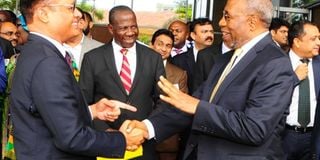Prime
India’s Exim Bank seeks to lend to Uganda government

Exim Bank of india general manager Madhusudan Agrawal (left) talks to Prime Minister Ruhakana Rugunda and Finance minister Matia Kasaija (centre) during the Uganda-India business forum for Indian investors in Kampala last week. PHOTO BY RACHEL MABALA
What you need to know:
- Mr Nadeem Panjetan, the chief general manager, Exim Bank of India last week met with Prime Minister Ruhakana Rugunda, Finance minister Matia Kasaija, and Education minister Janet Museveni, to state their case on why Uganda would be an important destination for their loans.
- India is Uganda’s second largest origin of imports after China. India used to be in the lead until China overtook it in 2016.
Kampala. India’s Export and Import Bank (Exim) is looking to expand its influence in Africa. Bank officials were in Uganda courting the government on the possibility of doing business together.
India’s Exim Bank operates like the Exim Bank of China in form of lending to governments looking to invest in infrastructure projects.
Mr Nadeem Panjetan, the chief general manager, Exim Bank of India last week met with Prime Minister Ruhakana Rugunda, Finance minister Matia Kasaija, and Education minister Janet Museveni, to state their case on why Uganda would be an important destination for their loans.
He stated that they had funds to finance projects in the country ranging from energy, irrigation, healthcare, and agriculture.
He, however, said it was up to the government of Uganda to approach Exim Bank India for the loans on non-concessional terms. In Africa, most of the projects the bank has lent to are in the power sector.
“It is the borrowing government that has to initiate discussions for us to create a line of credit.
The government must submit its proposal through the Indian Ambassador to Uganda for consideration by the bank,” he said.
Mr Kasaija was non-committal on securing loans from India at the moment. The government is already engaging China’s Exim Bank to secure about Shs8 trillion to finance the Malaba-Kampala route of the Standard Gauge Railway (SGR).
Mr Nadeem came with a team of 42 Indian businessmen and leaders looking for opportunities in Uganda.
There were no concluded deals but there was a commitment of about $150m from companies to set up a pharmaceutical plant, cement production, and power generation.
Uganda is looking to further industrialise in order to create jobs and reach middle-income status by 2020, which explains the need for foreign direct investment.
The delegation was presented with investing either in industrial parks or the free zones.
“Uganda is committed to ensuring that whatever is possible is done to fast-track business and investments in the many lucrative areas that are available. Needless delays and unnecessary bureaucracies are luxuries we simply cannot afford,” Mr Rugunda told the delegation.
India is Uganda’s second largest origin of imports after China. India used to be in the lead until China overtook it in 2016.




